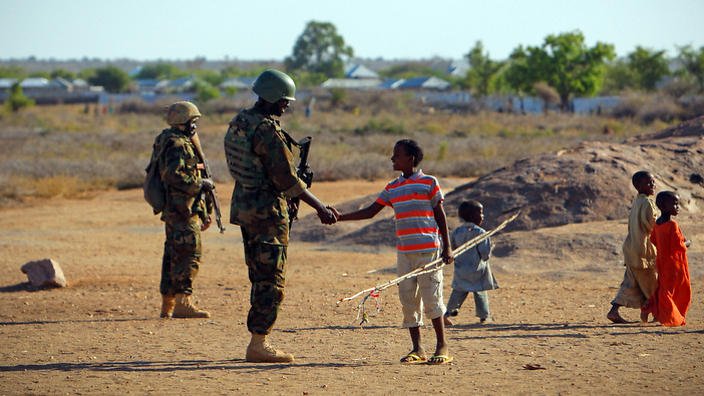
A Somali boy greeting a Ugandan soldier serving with the African Union Mission in Somalia (AMISOM) in the central town of Buur-Hakba
The international community remains worried about Somalia’s prospects for returning to stability.
By Olga Klepova
Somalia’s new Prime Minister will try again on Monday to put a Cabinet in place after the parliament rejected his first lineup amid weeks of political uncertainty.
That would be the next step towards organising elections in the war-torn east African country next year.
But as Olga Klepova reports, the international community remains worried about Somalia’s prospects for returning to stability.
Somalia has been in chaos since the 1991 ousting of the dictator Siad Barre.
With the support of foreign troops, the country’s weak government controls only the capital Mogadishu and central parts of the country.
The rest of the country remains under the control of rival clans and militants of the Al-Shabab group.
The UN representative to Somalia, Nicholas Kay, says with the support of the international community, Somalia is on the verge of waking from a two-decade-long nightmare.
But he warns the situation remains extremely delicate.
“I welcome the appointment of the new Prime Minister Omar Abdirashid Ali Sharmarke but I’m disappointed that it is not yet been possible to reach agreement with parliament on a new cabinet. Once a cabinet has been approved future crises need to be avoided. Stabilisation has to work this year. I look forward to greater implementation of the federal government’s stabilisation strategy, particularly local reconciliation and peace building activities but Somalia is still teetering on the edge.”
Somalia’s representative to the United Nations, Awale Ali Kullane says there is an urgent need for national unity.
He sees building up regional-level government as a priority.
“While the political stability and unity is of course optimal it is a lack of the capacity of federal institution that’s the more pressing issue faced in Somalia. Discussions are ongoing for the establishment of the interim regional administration covering the remaining southern and central regions of Somalia. The formalisation of the government system must now extend outward to regional level government. This process must be overseen by the centre but be responsive to local demands and mindful of local context.”
The government in Mogadishu is currently being supported by African Union troops who have been battling against Al-Shabab militants since 2007.
Al-Shabab, which promotes strict Islamic rules of Sharia including stoning to death, still controls many rural areas and often carries out suicide attacks.
Head of the African Union Mission in Somalia, Maman Sidikou, says its nature has changed and the government should address this.
“Al-Shabab has and will continue to result asymmetric attacks they will continue to seek to disrupt our main supply routes and also step up attacks in the subregion. The Al-Shabab of today is not Al-Shabab of yesterday. We must therefore respond to this new reality accordingly. We simply cannot afford to do business as usual. Yes, we have achieved a lot but we can do better and achieve even much more.”
Mr Sidikou agrees that the support of local governments is crucial.
He says the African Union has been doing its best to help restoration of basic services in areas cleared of Al-Shabab – and local security forces also need reinforcement.
“Using our experience to fight in the recovered areas we have been able to define the critically required resources including engineering, medical, and civilian military cooperation capabilities. With these capabilities our military units will carry out basic social service support to local government authorities but we both facilitate the restoration of governance and also win the population. I believe that our policing efforts have to now involve more of community policing. There is the extremely urgent need for accelerated development of Somalia security forces to continue enabling stabilisation efforts and to avoid reversal of the gains that have been made to date.”
With Al-Shabab remaining a serious barrier to the process of federalisation, there are multiple other issues that need to be addressed.
The UN representative to Somalia, Nicholas Kay, says inter-clan disputes could lead to more serious conflicts.
“The importance of the political process this year will raise the stakes in the Somalia politics. I worry that tensions will rise as the 2016 elections get closer. Somalia’s people and nascent institutions will be breaking historic new ground this year as the country moves down the road to federalism and democracy. Al-Shabab is not the only threat they face. Between the UN, AMISOM and federal and regional authorities we need to recognise and respond to the continuing potential for local Inter-clan disputes leading to conflict.”
Somalia’s representative to the UN, Awale Ali Kullane, agrees that his country faces months of political uncertainty, but he remains optimistic.
“Somalia is at a critical juncture in its effort to achieve security and stability. We are winning the war but must win the peace. As we look forward the next 2 years we must urgently deliver on priority legislation, establishment of commissions and ensure the public consultations that will enable us to achieve that we intertwined strength of vision 2016.”
Source: SBS


Leave a Reply